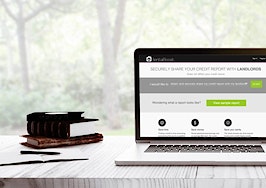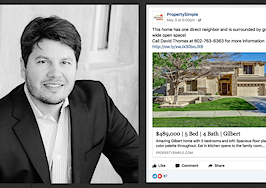- Always ease into real estate conversation tactfully.
- Sharing a common interest with your leads will guarantee smooth conversation.
- Posting useful content on Facebook is a great way to follow up with leads.
“We’re not in the business of selling houses. … We’re in the people-knowing business.”
That is a quote from a recent interview I did with Jacob Swodeck, co-founder of The Associates Realty Group, the fastest growing real estate brokerage in Southern California.
Most agents I know tell me they got into real estate for lifestyle.
So, to pick this career for lifestyle, only to be a prisoner of methods that don’t feel congruent to who you are is not a career worth having. And it’s why many agents don’t make it in our industry.
Close to 70 percent of people choose their agent because they were referred, know them or were past clients; despite all the buzz (and outflow of cash) around internet leads, this business is still about relationships.
I love the idea of gaining influence and large databases by building a “tribe” of people who share your interests. So, when I heard Swodeck had built a tribe around #freebeer, I had to ask about his approach.
(To see the full interview on how Swodeck is using #freebeer to grow his business, click here)
Here’s what he shared:
1. Find commonalities outside of real estate
To build relationships with more people, find something you love to talk about outside of real estate. This becomes your point of connection. For Swodeck, that was #freebeer.
It started when he began serving free beer at open houses. He noticed the connections it created between people, and he saw how effective it was at sparking conversation. So, he and his business partners began consistently incorporating it into their marketing strategy.
You might not find that connection over beers — I’ve seen people build tribes around parenting, gardening, dogs, coffee, single motherhood, organic food and much more.
Find what you’re passionate about and use it to connect with your future tribe.
Most agents are inconsistent in their follow up. Many blame it on busy schedules, but my experience tells me that it’s because they think they have to be aggressive to stay connected, and they don’t want to be aggressive.
People don’t keep up with things that go against what they value. For example, if you value helping people and serving them, but feel like your follow up is bothersome or irrelevant, you won’t sustain a pattern of following up.
But if you have a tribe of people who like to drink and talk about free beer, for example, you’ll have no problem being consistent in your follow up because you know you have an engaged audience.
Not everyone in your city or current database will like your topic, but the people who do are vital to your tribe. Your goal is to build a viable audience of those vital few so that you have enough people to meet or exceed your financial goals.
Swodeck puts it this way: “If [you’re yourself], then that 5 percent that likes you becomes raving fans — they’re loyal to you and they tell everyone about you.”
2. Build an audience
Make sure there are enough people in your area who love the same thing as you. If you love macrame or some obscure topic that doesn’t have a big enough audience, you’ll have a hard time reaching a minimum viable audience.
Look at your topic in Facebook Ads manager under “Detailed Targeting.” You should see between 10,000 and 100,000 people in your local potential reach. That’s not a hard a fast rule, but it’s a place to start.
I’ve seen tribes built around a potential reach of 5,700 people, but you don’t want to go too small.
Some people have over 250,000 people. Still, 10,000 to 100,000 is a good place to start.
Set a goal of 4,000 fans within 6 months on a Facebook page dedicated to your topic. This represents a critical mass or minimum viable audience to begin seeing results.
That said, Swodeck saw results immediately by sponsoring a booth at a beer festival and holding drawings for people to win free beer. He even got a $650,000 listing from one of the guys he met at his booth.
3. Share content on social media
Create a Facebook page about your chosen topic, and upload content to your page regularly.
I like Facebook because it’s the fastest way to find “your people.” Once you know you have an audience, you can run ads in addition to other valuable content you post.
When Swodeck and his business partners decided to incorporate #freebeer into their business plan, they quickly built a Facebook page around it and uploaded plenty of videos and memes.
Posting content regularly is important because it serves as a follow up with your fans.
Swodeck confirms: “It may not be popular, but my number one CRM is Facebook. If people aren’t opening their email or answering their phone or opening their door, they’re on Facebook.
“It may not be traditional, but to me it’s more powerful. I don’t think our industry is ready to admit that the ways of old are not the best anymore.”
What we’re doing — whether it’s through traditional email, postcard or Facebook — is staying in touch.
We’re building value and engagement with people. We’re building familiarity and influence with people who will become our tribe.
You can quickly and affordably stay connected and relevant to your tribe with these power tools Facebook gives you for building custom audiences.
For example, you can build custom audiences of people who have watched 25% or more of your videos. This is powerful because it’s a warmer audience.
The same is true for building a custom audience of people who have interacted with your page. Again, a warmer audience.
“I feel I get a better ROI from video on Facebook,” says Swodeck. “As tech is evolving, people are less into the linear methods. It’s got to be stuff that’s interesting to them.”
If people have watched 25% or more of your video or are engaging with your page, then you know there’s some interest.
Just be careful not to bait and switch your growing fans with aggressive and shameless real estate plugs or you’ll lose their respect.
4. Why you should transition with tact
After attracting your audience, you should ease into real estate talk in a non-aggressive, tasteful way.
When Swodeck and his partners decided to incorporate #freebeer into their marketing, they decided to leave the real estate talk out in the beginning.
“It’s really simple,” he said. “There are people that live in those houses and you have to know those people in order for them to want you to list their home.
“It’s just about knowing more people. The more people you know the greater chance you have of selling a house.”
In fact, Swodeck sited NAR’s profile of homebuyers and sellers saying, “63 percent of people chose their agent because of referral, past client or knew them. We call that iPhone money.”
That’s close to seven out of 10 clients coming from relationships.
This is so important because people only buy our product every nine years, according to NAR. If you want more business, you have to create deeper relationships with your sphere of influence and your fans.
You do that by finding something you both like to talk about.
So do you just talk about beer and never talk about real estate?
No.
There is a tasteful, effective and authentic way to do it. I call it “bridging” or “professional backstory.”
5. Bridging
When people see you doing real estate related things — like holding an open house — they understand that you’re in real estate.
“I’m not there for the lead,” Swodeck says. “I just want that door to open for them to think about me. Because most don’t need to sell right away.”
You do have to be ready to bring up real estate eventually. Swodeck starts by asking: “What are your long term real estate plans?”
That’s it. It’s not offensive, and people have an answer to this question every time. Asking great questions and listening closely is something relationship-based agents do wonderfully.
When people share their life plans, they are in a sense saying, “I trust you enough to tell you these personal plans.” You can then follow up with helpful information that will make their decision easier.
As you build your fan base and increase your engagement you’ll find momentum similar to that of #freebeer.
“It’s all relationship stuff,” says Swodeck. “You have to find a way to be fully authentic to who you are. Don’t be shy about who you are. We’re just real estate guys that love to give away free beer.”
What demographic are you looking for?
What interests and passions do those people have outside of real estate?
Do those passions overlap with your passions?
How can you connect with people, inspire them and share content with them?
How can you earn their attention and their trust?
These people are your tribe, and they have the power to change your business forever.
Chris Angell is an author, speaker and coach with Groundswell Business Consulting. You can connect with him on Facebook or Twitter.












